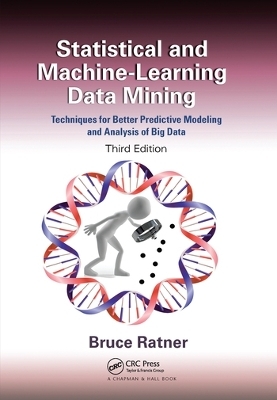
Statistical and Machine-Learning Data Mining:
Chapman & Hall/CRC (Verlag)
978-0-367-57360-7 (ISBN)
Interest in predictive analytics of big data has grown exponentially in the four years since the publication of Statistical and Machine-Learning Data Mining: Techniques for Better Predictive Modeling and Analysis of Big Data, Second Edition. In the third edition of this bestseller, the author has completely revised, reorganized, and repositioned the original chapters and produced 13 new chapters of creative and useful machine-learning data mining techniques. In sum, the 43 chapters of simple yet insightful quantitative techniques make this book unique in the field of data mining literature.
What is new in the Third Edition:
The current chapters have been completely rewritten.
The core content has been extended with strategies and methods for problems drawn from the top predictive analytics conference and statistical modeling workshops.
Adds thirteen new chapters including coverage of data science and its rise, market share estimation, share of wallet modeling without survey data, latent market segmentation, statistical regression modeling that deals with incomplete data, decile analysis assessment in terms of the predictive power of the data, and a user-friendly version of text mining, not requiring an advanced background in natural language processing (NLP).
Includes SAS subroutines which can be easily converted to other languages.
As in the previous edition, this book offers detailed background, discussion, and illustration of specific methods for solving the most commonly experienced problems in predictive modeling and analysis of big data. The author addresses each methodology and assigns its application to a specific type of problem. To better ground readers, the book provides an in-depth discussion of the basic methodologies of predictive modeling and analysis. While this type of overview has been attempted before, this approach offers a truly nitty-gritty, step-by-step method that both tyros and experts in the field can enjoy playing with.
Bruce Ratner, The Significant StatisticianTM, is President and Founder of DM STAT-1 Consulting, the ensample for Statistical Modeling, Analysis and Data Mining, and Machine-learning Data Mining in the DM Space. DM STAT-1 specializes in all standard statistical techniques, and methods using machine-learning/statistics algorithms, such as its patented GenIQ Model, to achieve its clients' goals – across industries including Direct and Database Marketing, Banking, Insurance, Finance, Retail, Telecommunications, Healthcare, Pharmaceutical, Publication & Circulation, Mass & Direct Advertising, Catalog Marketing, e-Commerce, Web-mining, B2B, Human Capital Management, Risk Management, and Nonprofit Fundraising. Bruce holds a doctorate in mathematics and statistics, with a concentration in multivariate statistics and response model simulation. His research interests include developing hybrid-modeling techniques, which combine traditional statistics and machine learning methods. He holds a patent for a unique application in solving the two-group classification problem with genetic programming.
Preface to Third Edition
Preface of Second Edition
Acknowledgments
Author
1. Introduction
2. Science Dealing with Data: Statistics and Data Science
3. Two Basic Data Mining Methods for Variable Assessment
4. CHAID-Based Data Mining for Paired-Variable Assessment
5. The Importance of Straight Data Simplicity and Desirability for Good Model-Building Practice
6. Symmetrizing Ranked Data: A Statistical Data Mining Method for Improving the Predictive Power of Data
7. Principal Component Analysis: A Statistical Data Mining Method for Many-Variable Assessment
8. Market Share Estimation: Data Mining for an Exceptional Case
9. The Correlation Coefficient: Its Values Range between Plus and Minus 1, or Do They?
10. Logistic Regression: The Workhorse of Response Modeling
11. Predicting Share of Wallet without Survey Data
12. Ordinary Regression: The Workhorse of Profit Modeling
13. Variable Selection Methods in Regression: Ignorable Problem, Notable Solution
14. CHAID for Interpreting a Logistic Regression Model
15. The Importance of the Regression Coefficient
16. The Average Correlation: A Statistical Data Mining Measure for Assessment of Competing Predictive Models and the Importance of the Predictor Variables
17. CHAID for Specifying a Model with Interaction Variables
18. Market Segmentation Classification Modeling with Logistic Regression
19. Market Segmentation Based on Time-Series Data Using Latent Class Analysis
20. Market Segmentation: An Easy Way to Understand the Segments
21. The Statistical Regression Model: An Easy Way to Understand the Model
22. CHAID as a Method for Filling in Missing Values
23. Model Building with Big Complete and Incomplete Data
24. Art, Science, Numbers, and Poetry
25. Identifying Your Best Customers: Descriptive, Predictive, and Look-Alike Profiling
26. Assessment of Marketing Models
27. Decile Analysis: Perspective and Performance
28. Net T-C Lift Model: Assessing the Net Effects of Test and Control Campaigns
29. Bootstrapping in Marketing: A New Approach for Validating Models
30. Validating the Logistic Regression Model: Try Bootstrapping
31. Visualization of Marketing Models: Data Mining to Uncover Innards of a Model
32. The Predictive Contribution Coefficient: A Measure of Predictive Importance
33. Regression Modeling Involves Art, Science, and Poetry, Too
34. Opening the Dataset: A Twelve-Step Program for Dataholics
35. Genetic and Statistic Regression Models: A Comparison
36. Data Reuse: A Powerful Data Mining Effect of the GenIQ Model
37. A Data Mining Method for Moderating Outliers Instead of Discarding Them
38. Overfitting: Old Problem, New Solution
39. The Importance of Straight Data: Revisited
40. The GenIQ Model: Its Definition and an Application
41. Finding the Best Variables for Marketing Models
42. Interpretation of Coefficient-Free Models
43. Text Mining: Primer, Illustration, and TXTDM Software
44. Some of My Favorite Statistical Subroutines
Index
| Erscheinungsdatum | 01.07.2020 |
|---|---|
| Sprache | englisch |
| Maße | 178 x 254 mm |
| Gewicht | 453 g |
| Themenwelt | Informatik ► Datenbanken ► Data Warehouse / Data Mining |
| Informatik ► Theorie / Studium ► Künstliche Intelligenz / Robotik | |
| Mathematik / Informatik ► Mathematik ► Statistik | |
| Technik ► Umwelttechnik / Biotechnologie | |
| ISBN-10 | 0-367-57360-1 / 0367573601 |
| ISBN-13 | 978-0-367-57360-7 / 9780367573607 |
| Zustand | Neuware |
| Haben Sie eine Frage zum Produkt? |
aus dem Bereich


